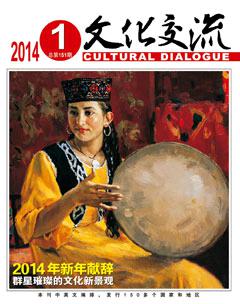俄罗斯当代油画惊艳杭城
周敏杰



前不久,一场“俄罗斯当代油画精品展”在杭州展出,俄罗斯当代油画家的100多幅精品油画惊艳杭城,吸引了大批观众和专家观摹与热评。
展出的作品全部出自当代俄罗斯画家之手。这些作品风格各异、色彩浓郁,不仅生动地展现了俄罗斯的风土人情、自然景色和人物风貌,凸显油画艺术的迷人魅力,而且形象地反映出当代俄罗斯艺术家们崇尚自然、真实、完美的审美情趣,还充分地体现了俄罗斯艺术的发展及其在世界艺术史上的重要地位。中国美术学院油画系胡振宇教授感慨地说道:“这是我在杭州第一次这么大范围地接触到当代俄罗斯油画,这些作品的确跟老一辈画家风格完全不同,这一代画家有他们自己的艺术语言,但同时又能从色彩和笔触上看出传承前辈的影子。能把他们的优秀作品集中到一起展出,这样的机会很好,也很难得。 ”
从公元9世纪的蛋彩画到今天,俄罗斯油画已经走过了一千多年的历程。19世纪已是俄罗斯油画发展和成熟时期。
当代俄罗斯部分著名画家,他们都有作品在中国杭州“俄罗斯当代油画精品展”中展出。
Russian artists represented at the Exhibition of Russian Oil Painting Masterpieces in Hangzhou
今天的俄罗斯油画拥有坚实的历史文化传统。中国美术批评家年会学术委员、浙江大学美学与批评理论研究所所长沈语冰教授是此次展览的学术主持。在展览开幕之前,他特意为到场的观众讲解了当代俄罗斯油画的美学价值以及如何鉴赏本次参展作品。他说:“这批画家年龄大约在五六十岁,既继承了传统俄罗斯油画的精神,又逐渐从趋向写实的俄罗斯画派中走出来,比如库拉科夫,他的人物画用色明亮大胆,造型上也有些许夏加尔的影子,可以明显地看到画家受巴黎画派的影响很深。 ”他的讲解让观众听得津津有味,座无虚席,来迟一点的只能站着听。
作为世界上最具有文化艺术底蕴的俄罗斯油画,无论是意境深幽的自然景色,还是朴实真切的人物形象,总能够带给观众一种特殊的亲切和感动。就在2013年上半年,此次参展的画家中的谢夫楚科、德米特里、拉申得以及斯威特莱娜四位艺术家都曾到访过杭州,并在西湖边游览与写生。曾经陪着他们写生的沈语冰教授向大家一一作了介绍。
澡堂 斯威特莱娜作 Bath House, by Swetlena
FRIENDSHIP友好往来
画展中谢夫楚科的《泊位》《中国景》、斯威特莱娜的《金色船顶》《相遇中国》就是他们在西子湖畔体验生活后创作的作品。中国杭州的风景在俄罗斯画家的眼里是怎么样的?是春天的垂柳、烟雨中的湖山,还是金色的船顶、停泊在岸边的游船?那幅《泊位》用灰色的油彩勾勒了一幅中国水墨画般的西湖小景。远处的湖面空远淡雅,给人以遐想空间;近景中并泊的游船,体现了西方油画的艺术魅力。而《金色船顶》中金色的船顶和红色的船体形成浓郁的东方风情。右边绿色的柳树,在色彩和构图上刚好平衡了左边的游船。这两幅描绘西湖胜景的作品都显得灵动、亲切,充满着人文关怀。
俄罗斯当代著名画家瓦西里 ·谢夫楚科系俄罗斯功勋艺术家、圣彼得堡油画家协会理事。1992年毕业于列宾美术学院,也是该学院优秀毕业生金奖获得者。他与夫人谢夫楚科·斯威特莱娜女士是家喻户晓的享誉俄罗斯当代画坛的艺术家伉俪。他们的许多作品被俄罗斯、美国、法国、瑞典、英国、德国等国家博物馆收藏。
在众多的俄罗斯油画作品中,风景油画占有很大的比例,很多人认为,油画作品所描绘的风景意境是其他画作所不能比拟的。拉申得的布面油画《海风》,那无形的海风通过有形的海浪表现出来。一层一层的海浪在海风的推动下涌向岸边,拍打岩石,化成白色的浪花。这些浪花像白色的海鸥一样自由飞舞。
一幅呈现着生机勃勃田园之景的《澡堂》,鲜艳明亮的色彩仿佛让我们仿佛闻到乡野的清新气息。整幅画面没有人物,但是屋前几只啄食的母鸡和旁边的手推车告诉人们,木屋的主人或许刚刚离开。
人物画在俄罗斯油画中特色鲜明,独具个性。无论是人物肖像,还是在一定场景中的群像,或坚毅、粗犷,或曼妙、细腻,都能让人感觉到厚实饱满,亲切传神。
卢卡申诺克的《西班牙的旋律》,大胆地使用浓烈的色块,冷暖色调交织出舞厅的繁华热闹。吉他的旋律透过缤纷的色彩,让人感到激越,人物的舞蹈让画面充满动感。作品妙在整幅画面色彩厚重,却不显得纷杂眩目。画家是搭配颜色的高手,善于吸纳版画、雕塑的元素,使作品具备极佳的装饰效果。
西班牙的旋律 卢卡申诺克作
Spanish Melody, by Lukasennov
沐浴 萨卡洛夫作 Bathing, by Sokolov
金色船顶 斯威特莱娜作
Golden Roofs, by Swetlena
画作在宁静中显示艳丽,但这种艳丽又不失优雅。
俄罗斯油画是世界绘画艺术史上浓墨重彩的篇章,也是人们认识和学习俄罗斯文化、解读俄罗斯风情的重要途径。俄罗斯作为中国的友好邻邦,两国不仅在科技经济方面交流甚多,在文化与艺术上也是密切合作,共同发展。我国当代的很多著名油画
家都曾师从俄罗斯艺术大师。正如俄罗斯文学影响了数代中国
读者一样,俄罗斯油画也影响了我国一代又一代艺术家。俄罗斯当代油画依然以其真诚与美丽打动着今天的中
国观众。□
Russian Colors Amaze Hangzhou
从法国进修造型艺术回国不久的李蒙先生在一幅《沐浴》画前驻足观摹。他告诉笔者,这幅画是萨卡洛夫的代表作,线条和色调处理得非常好,很美。整个构图看似平面化,却又充满纵深感。前景的花卉与后面的人物构成了画面的视觉空间。
By Zhou Minjie
An oil painting exhibition held in Hangzhou from September 10 through 20, 2013 brought the virtuoso art of Russia into the capital of Zhejiang and amazed the art circles and oil painting lovers of the city. More than 100 oil painting works, all by contemporary Russian artists, drew an elite turnout.
Representing various genres and styles, the paintings demon-strate the colorful folk charm and scenic beauty of Russia in vibrant colors, vividly reflecting the artists aesthetic pursuit for naturalism, truth and perfection, as well as the indispensable role the Russian arts play in the worlds art history.
“This is the first time the contemporary trends of Russian oil paintings are brought to Hangzhou with such a scale. The style of the new generation of Russian oil painting artists is noticeably dif-ferent from their predecessors. The exhibition provides a golden chance for people in Hangzhou to relish the unique artistic lan-guage of contemporary Russian art circle. The influences from the elder generations are woven magically into the colors and strokes,” comments Hu Zhenyu, from the Oil Painting Department of China Academy of Art.
The history of the art of Russian oil painting dates back more
than 1,000 years ago in the 9th Century. The 19th Century also saw the heyday of the Russian oil painting artists community. Today, the solid cultural and historical foundation still constitutes the essence of the Russian oil painting landscape.
A brief lecture by Shen Yubing, a professor from Zhejiang Uni-versity and an attendee of the annual meeting of the China Art Crit-ics Association, took place prior to the opening of the exhibition. Shen shared with the audience the aesthetic basics of contemporary Russian oil painting with the visitors.
“Most of the participating artists were born in the 1940s-1950s, which makes them take the transition role by breaking away with the conventional realism framework while maintaining the core spirit of the tradition. An outstanding example is Kulakov, whose portrait oil paintings are characteristic of bold, vibrant colors and noticeable influences from Marc Chagall (a Russian-French artist and ‘the quintessential Jewish artist of the twentieth century).”
The oil painting artist community is a dazzling star in the world's art galaxy, known for its unrivalled high artistry interpreted through natural, clear and very moving conceptions that touch the depths of the hearts of the viewers. Four of the participating artists visited Hangzhou earlier last year. The beauty of the West Lake and the landscape of the lakeshores is recounted in their virtuoso strokes and colors in such genius impromptu pieces as Berth, Encounter with China and China Landscape, all highlighting how the unique flair of the Western-style art of oil painting gets woven with tradi-tional Oriental elements.
The Russian oil painting masters are famed for their aptness in presenting the subtlest enchantment of natural landscapes, as shown in one of the pieces, named Wind from the Sea. The motion of the intangible wind fluttering with the undulating waves towards the shores and producing a milky smother of foam is magically pre-sented on a piece of canvas.
Another piece that beautifully conveys the expressive force of Russian oil painting is Bathhouse, in which festive, flaming colors bring the refreshing pastoral aroma into full swing. The pecking hens and a trolley nearby insinuate the owner of the wooden hut has
泊位 谢夫楚科作 Mooring berth, by Shevchuk
中国景 谢夫楚科作 A Chinese Scene, by Shevchuk
just left.
Russian oil painting artists also enjoy a special position in the portrait painting vista of the world. They are all masters of colors, texture and composition. The mellowness of the colors and exqui-site brushwork make every piece lifelike and breathe. The color scheme is flamboyant but not too dazzling, complete with a fitting use of printing and sculpting touches in the collage of colors that creates supreme decorative effects.
The oil paintings constitute a crucial part in the cultural landscape of Russia and in the painting art history of the world. It is the long-standing tradition of cultural cooperation and communication be-tween China and Russia that makes such profound artistry open for generations of Chinese artists to learn from, just like how the Chinese literati has drawn inspiration from their Russian counterparts.

